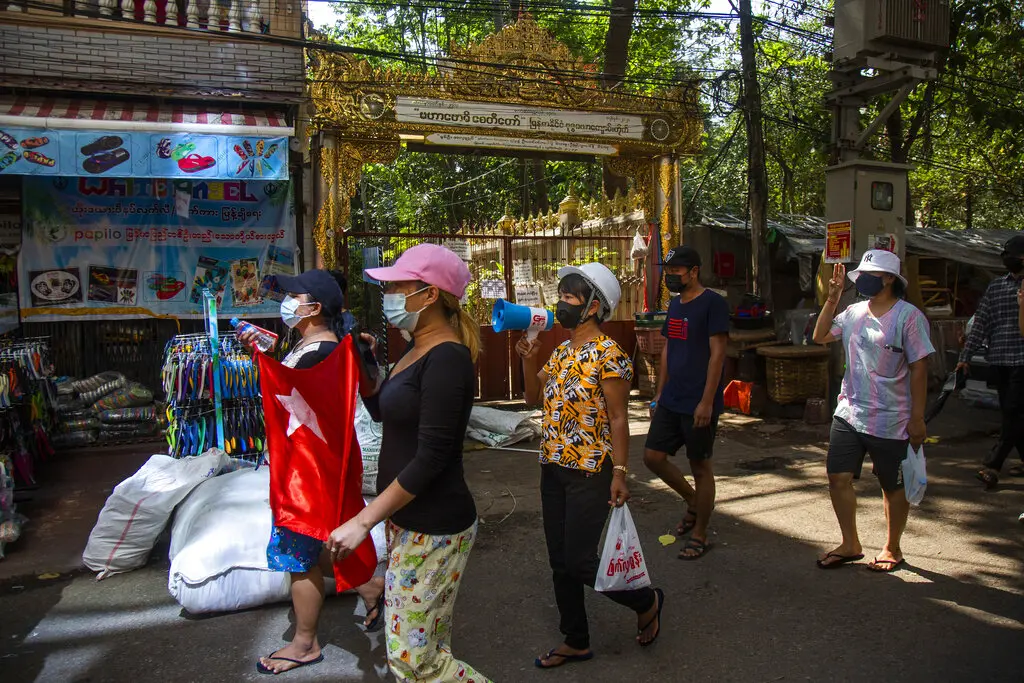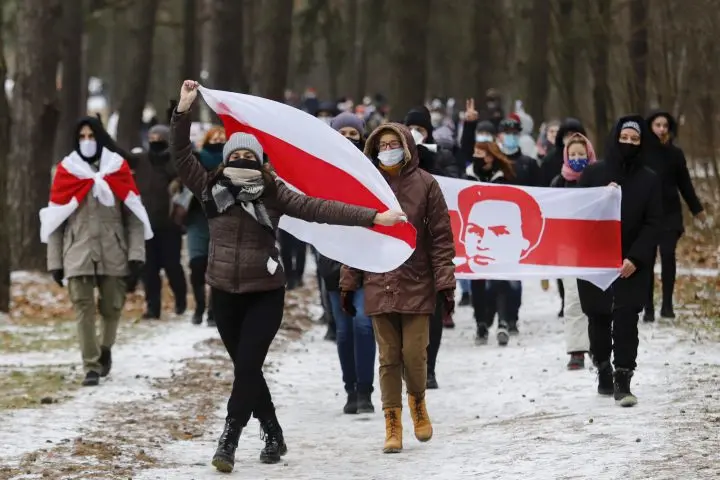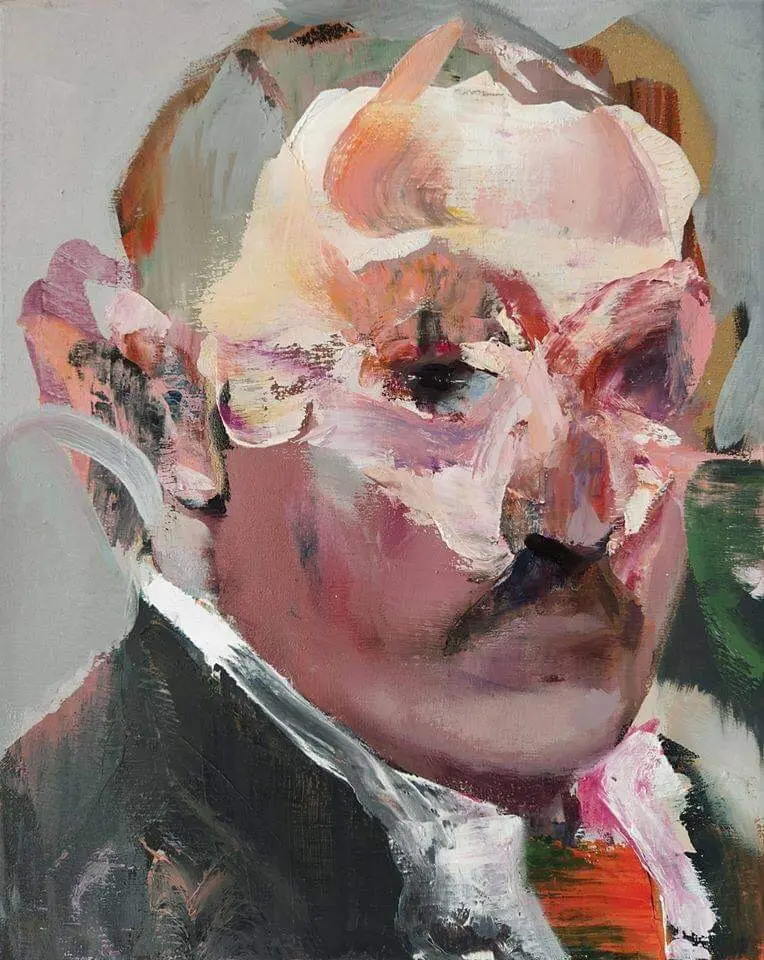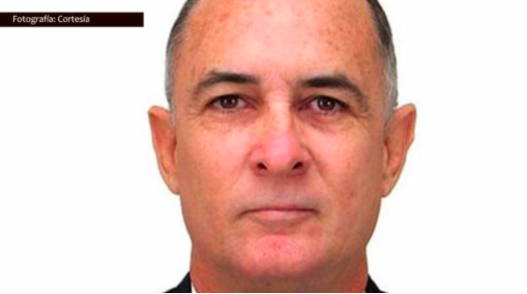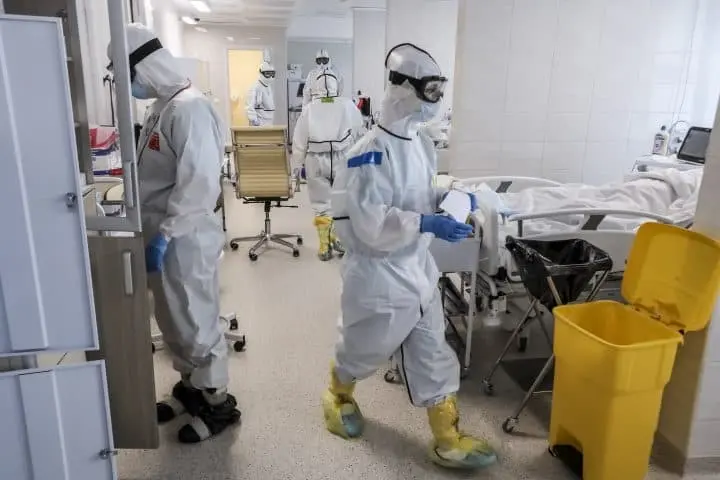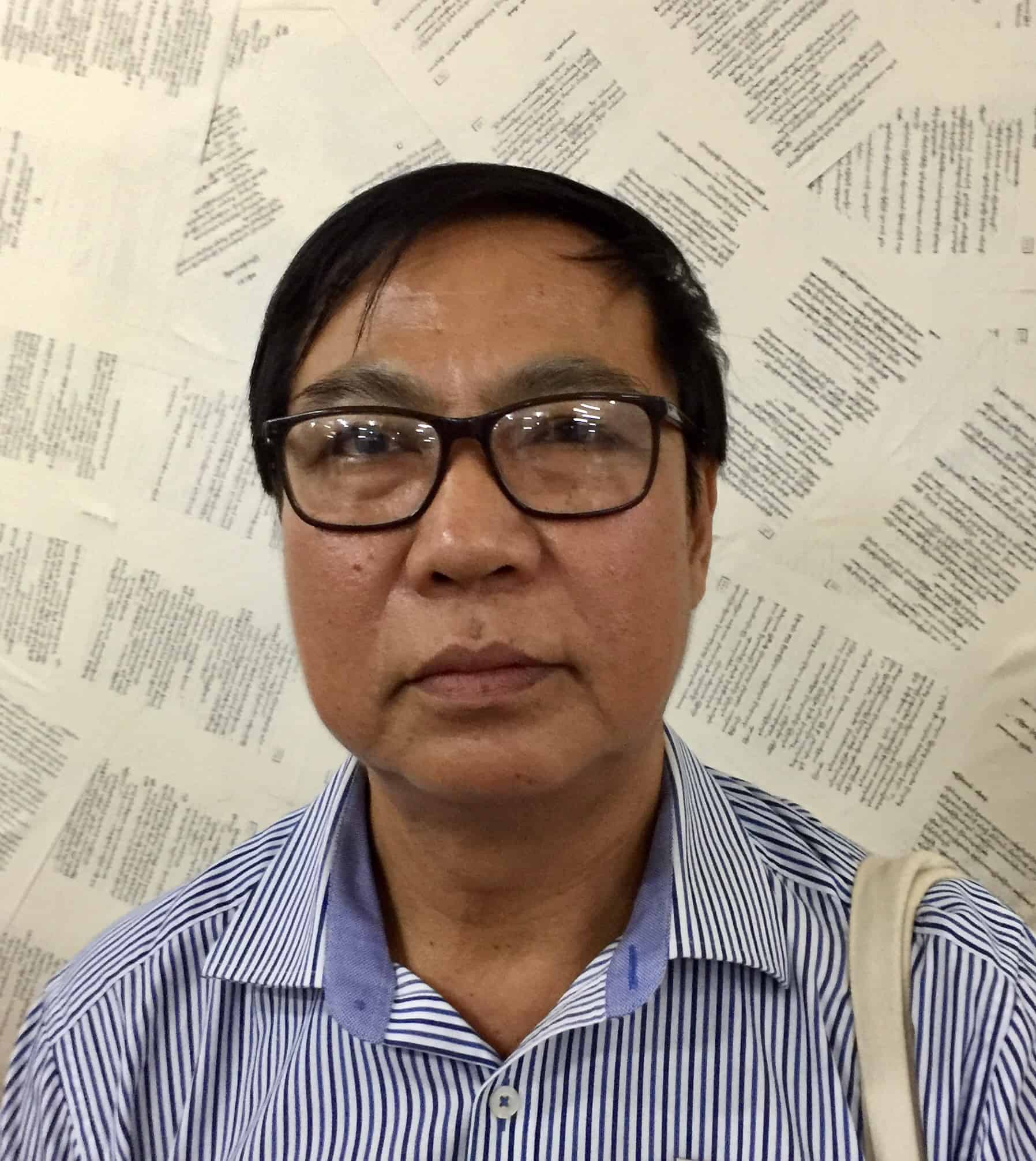Joint Communication to the UN Commission on the Status of Women by PEN America, The Raoul Wallenberg Centre for Human Rights (RWCHR), The International Bar Association (IBA), The Iran Human Rights Documentation Center, The Center for Human Rights in Iran (CHRI), and The Abdorrahman Boroumand Center for Human Rights in Iran (ABC) on July 21, 2021.
The Intensified Persecution and Prosecution of Iranian Women’s Rights Defenders
To the Commission on the Status of Women:
We write to alert you to the ongoing pattern of arbitrary arrests and detention of women human rights defenders in Iran, and the more recent disturbing trend of banishing them to exile in remote prisons, beyond public scrutiny. While upwards of 500 women are arbitrarily detained in Iran, this submission focuses on emblematic cases to illustrate broader trends of injustice against women’s rights defenders and discriminatory practices against women. These women’s rights defenders are generally charged with some of the most serious crimes under the Iranian Islamic Penal Code for nothing other than their peaceful activism leading the struggle for a more just, equal, and sustainable future for all citizens.
The COVID-19 Crisis and Urgency of Immediately Releasing Women’s Rights Defenders
We wish to underscore the urgency in seeking the unconditional release of these women, whose lives are at immediate risk, as the country suffers a fifth wave of COVID-19, exacerbated by nationwide water and electricity shortages. Imprisoned human rights defenders are specifically excluded from Iran’s temporary release programs, despite the Iranian judiciary purportedly boasting the temporary release of an unverifiable 100,000 prisoners during the pandemic. There is currently a COVID-19 outbreak in Evin Prison’s Women’s Ward, infecting a number of political prisoners, including Nahid Taghavi, a 66-year old German-Iranian with pre-existing health conditions, awaiting sentencing on national security charges after years of advocating for women’s rights. On July 17, 2021, Aliyeh Motallebzadeh, a women’s rights activist, leaked an audio note from Evin prison, decrying the dire COVID-19 outbreak in its women’s ward, where many inmates are presenting symptoms. When three women, the environmentalist Sepideh Kashani, writer Mozhgan Kavousi, and Nahid Taghavi tested positive for COVID-19, they were locked in a cell together and denied medical treatment or calls with their families. In the audio message, Motallebzadeh desperately laments that “it seems they put us here to die.” Raheleh Ahmadi, another women’s rights campaigner, was denied calls or furlough to be with her dying mother, and was only permitted to attend her mother’s funeral after the release of the audio note. Due to the international attention raised by the audio message, some of the women were temporarily released to recover at home.
During the pandemic, Iranian authorities have deliberately endangered the lives of imprisoned women’s rights defenders by confining them to facilities already highly susceptible to the spread of communicable disease and infection and adding punitive measures to their prison terms. Prisons in Iran have been woefully neglected, despite suffering from overcrowding, unsanitary conditions, poor ventilation, and severe resource shortages, including a lack of clean water, adequate food, and medical supplies. In 2020, the government ignored repeated letters from senior officials responsible for managing Iran’s prisons, urgently seeking resources to prevent and contain the spread of COVID-19 and treat patients. From the start of the pandemic, political prisoners have been forced to pay for necessities at prohibitive costs, while the Iranian government has yet to announce any vaccine roll-out program for prisoners.
Banishment of Women’s Rights Defenders to Prison Exile
The Iranian authorities have been increasingly banishing women’s rights defenders to prisons far removed from their place of residence, inflicting further psychological suffering on their families by depriving them of their ability to visit their loved ones. The UN Secretary General’s report on the situation of human rights in Iran this year specifically documented and highlighted “the punitive transfer of prisoners of conscience, including at least 15 detained women’s rights defenders.”
While Evin prison may be the most well-known for detaining political prisoners, women’s rights defenders are increasingly being sent to prisons with harsher conditions. Gharchak prison for women is of particular concern, infamous for having the worst prison conditions in Iran, where over 1,000 women are confined to a former livestock warehouse in ten-meter, windowless cells with at least 12 inmates per cell. The prison is unfit for human habitation, with no proper ventilation, clean air, drinkable water, or adequate food or medicine. The prison is surrounded by agricultural land, where farmers engage in field burning, causing an acrid and grotesque stench and smoke to engulf Gharchak’s prisoners. Between the field burning and poorly installed sewage system, prisoners are constantly facing difficulty breathing. Within the prison, women are forced to comply with a strict dress code, including the mandatory hijab and a ban on short sleeves, in a space where temperatures reach 46/47 degrees Celsius in the summer months. Moreover, political prisoners are held in the same cells as inmates convicted of violent crimes, in violation of both Iranian and international law.
A Growing Culture of Impunity: Iran’s Increasing Disregard for International Norms
The Iranian government has demonstrated no sign of cooperation on implementing its commitments under the Beijing Declaration and Platform for Action, the global blueprint for advancing gender equality and women’s empowerment unanimously adopted by 189 countries. To the contrary, the current government is actively engaged in preventing progress in these areas by aggressively targeting, abducting, intimidating, and torturing women leaders at home and abroad, in complete disregard of international norms. Recent reports submit that the Iranian State attempted to kidnap the US-based Iranian-American journalist and rights advocate Masih Alinejad along with unnamed activists in Canada and the UK, extending its repression extraterritorially. For Alinejad’s activism empowering Iranian women to civilly disobey the country’s mandatory hijab law, her brother, Alireza Alinejad, was also sentenced to eight years in prison on trumped-up national security charges in July 2020.
Since March 2019, the president-elect Ebrahim Raisi, as judiciary chief, has been responsible for directing Iran’s State Prisons’ Organization. During his tenure, he has presided over the escalating persecution of women’s rights defenders and the deaths in state custody of at least three political prisoners.
Emblematic Cases
The following emblematic cases demonstrate the growing persecution and prosecution of imprisoned women’s rights defenders across Iran. These women are being persecuted and subjected to arbitrary detention and torture for their work advancing the very goals outlined in Iran’s Constitution, including “the abolition of all forms of undesirable discrimination… [and] securing the multifarious rights of all citizens, both women and men, and providing legal protection for all, as well as the equality of all before the law.”
Human Rights Lawyers
Nasrin Sotoudeh
Nasrin Sotoudeh is a renowned human rights lawyer, one of the few active in a profession under threat in Iran. For three decades, Sotoudeh has tirelessly represented innocent children on death row, journalists, opposition leaders, religious minorities, public demonstrators, environmentalists, and women’s rights defenders, including Nobel Peace Prize laureate, Dr. Shirin Ebadi, among countless others.
In September 2010, Sotoudeh was first arbitrarily detained and sentenced to six years in prison for representing human rights defenders. Due to an international outcry, she was released in September 2013. During her detention, she was held in solitary confinement for prolonged periods of time and denied access to legal counsel and her family. On June 13, 2018, she was again arrested to serve a five-year prison sentence issued in absentia in 2016 for “espionage in hiding.” On August 26, 2018, the authorities added charges against her, a reprisal for the hunger strike she began a day earlier protesting the harassment and pressure against her and her family. On March 11, 2019, Sotoudeh was sentenced to 33.5 years in prison and 148 lashes on an additional seven charges on top of the five-year sentence in absentia. The charge entailing a 12-year prison sentence of “encouraging and promoting prostitution” was based on her defense of women involved in a feminist movement (“The Girls of Revolution Street”) who were charged for removing their headscarves in public. The other charges were based on her membership in a group that peacefully advocates against the death penalty; “conducting interviews with foreign media;” participating in peaceful gatherings; signing a public statement regarding a referendum; giving a speech outside of a UN office; and appearing in public without the hijab. In December 2020, the court commuted her sentence to 27 years, of which she must serve at least 10, and repealed the 148 lashes.
Since her most recent arrest, Sotoudeh has gone on four prolonged hunger strikes— the latter lasting 46 days, protesting the persistent denial of legal rights and remedies to political prisoners and demanding their release during the pandemic. Following her last hunger strike, she was briefly hospitalized with heart complications and difficulty breathing, where she was monitored and abused by a 24-hour security team and returned to Evin without receiving the urgent medical treatment she required. Prison officials then advised Sotoudeh that she would be sent back to the hospital for the urgent medical procedure, but instead transferred her to Gharchak prison in a ward suffering from a COVID-19 outbreak. As a result, on November 10, Sotoudeh tested positive.
The UN Special Procedures have unequivocally asserted that the “evidence suggests Sotoudeh’s imprisonment, both now and in the past, is state retaliation for her tireless work defending human rights.” UN experts, international organizations, and world and religious leaders, including Pope Francis, US President Joe Biden, and French President Emmanuel Macron, among others, have repeatedly called for Sotoudeh’s release, to no avail. Over the course of her imprisonment, the authorities have inflicted further suffering on Sotoudeh by targeting her family. The authorities arrested her husband, Reza Khandan, in 2018 and later sentenced him to six years in prison for posting updates about Sotoudeh’s case, and briefly detained her 20-year-old daughter, Mehraveh, in August 2020 to pressure Sotoudeh to end her most recent hunger strike. In May 2020, the authorities froze her family’s bank accounts, which remain frozen to this day, despite repeated appeals by the family to reverse the baseless punitive measure. Given Sotoudeh’s heart condition, her continued imprisonment in Gharchak poses a grave threat to her health.
Soheila Hejab
Soheila Hejab is a human rights lawyer who was sentenced for her political and women’s rights activism. In December 2018, she was arrested and sentenced to two years in prison for “supporting an anti-state organization,” and released five months later from Adelabad Prison. On June 6, 2019, she was re-arrested and taken to Evin, where she faced death threats and was beaten by guards to the point of hospitalization on two occasions. On December 21, 2019, she participated in a peaceful sit-in in solidarity with the victims of the November 2019 extrajudicial killings by the State. On March 18, 2020, judge Mohammad Moghiseh sentenced her to 18 years in prison for “propaganda against the state,” “forming a group for women’s rights,” and “demanding a referendum for changing the constitution.” On May 23, 2020, her sentence was upheld. In an audio recording, she revealed that, on that same day, security agents dragged her by the hair and punched and kicked her in the head before taking her to Gharchak prison. In June 2020, she went on hunger strike to protest the inhumane living conditions there. From prison, she has continued to advocate for defendant’s rights and the release of political prisoners, including her brother.
Human Rights, Political Prisoners, and Anti-Death Penalty Advocates
Narges Mohammadi
Narges Mohammadi is an independent journalist, human rights defender, and the deputy director of the Defenders of Human Rights Centre (DHRC), a human rights organization headed by Nobel Laureate, Dr. Shirin Ebadi. Mohammadi’s advocacy has focused largely on the abolition of the death penalty in Iran and the rights of political prisoners.
As a result of her activism, she has long been the target of State persecution. Since 2009, she has been barred from travelling abroad and arrested a number of times for her advocacy. In September 2011, she was sentenced to 11 years in prison for “acting against national security,” “propaganda against the State,” and “membership in the banned DHRC.” In June 2012, she was released after being hospitalized and deemed unfit to serve the remainder.
In 2015, Mohammadi was again arrested and charged with the similar, tired charges of “assembly and collusion against national security,” “propaganda against the state,” and “membership in the Step by Step to Stop the Death Penalty (LEGAM)” group. During her time in prison, she embarked on at least two hunger strikes, the second of which was conducted alongside British-Iranian prisoner, Nazanin Zaghari-Ratcliffe, in response to their denial of adequate medical care. On October 8, 2020, she was released due to sustained international advocacy. On December 25, 2019, she was physically abused and, was forcibly transferred to Zanjan prison, about 300 km from Tehran, for merely participating in a peaceful sit-in in solidarity with the victims of the November 2019 extrajudicial killings by the State.
In June 2021, intelligence agents harassed and beat Mohammadi on her way to visiting victims of human rights abuses. On May 19, 2021, she was sentenced in absentia to 30 months in prison and 80 lashes on the charges of “spreading propaganda,” “defamation,” and “rebellion against prison authorities” for simply making statements against the death penalty; staging the December sit-in; and speaking out against prison authorities for torturing her. On May 27, 2021, she hosted an online group discussion on the Clubhouse app regarding widespread rape and sexual abuse committed by prison officials and interrogators, and opened up about her own experience when she was violently exiled to Zanjan.
Atena Daemi
Atena Daemi is a women’s and children’s rights defender, who has also campaigned against the death penalty. On May 14, 2014, she was sentenced to 14 years in prison on national security charges and “insulting the leader or founder of the Islamic Republic of Iran” for social media posts criticizing Iran’s execution record, distributing anti-death penalty leaflets, meeting with political prisoners’ families, condemning the 1988 mass executions, listening to Iranian rapper Shahin Najafi, and attending peaceful demonstrations, including protesting the unjust execution of Reyhaneh Jabbari. In September 2016, the Court of Appeals reduced her sentence to seven years. On November 26, 2016, she was arrested, beaten, and subjected to pepper spray by Revolutionary Guards agents. In April 2017, the authorities added 91 days to her sentence and sentenced her sisters to 91 days each as a reprisal for Daemi’s excessive force complaint against the agents who violently arrested her. As a result, on April 11, 2017, she began a 54-day hunger strike, which ended after the 91-day sentences against her and her sisters were dropped. In February 2018, Daemi joined Golrokh Ebrahimi Iraee, an imprisoned writer and rights defender (see below), on a hunger strike protesting their transfer from Evin to Gharchak prison and ill-treatment there. On December 28, 2019 she was transferred to solitary confinement, where she was physically abused and denied medical treatment, for participating in the peaceful December sit-in with other women’s rights defenders.
In June 2020, a month before her scheduled release, she faced new charges. On July 2, 2020, she was sentenced to two additional years in prison and 74 lashes. In February 2021, the Supreme Court rejected her request for a retrial. On 16 March 2021, she was abruptly transferred from Evin to Lakan Prison in Rasht, northern Iran. In prison, she has tirelessly campaigned for prisoners’ rights and the release of political prisoners, despite being repeatedly denied timely medical care, held in solitary confinement for months at a time, and hospitalized as a result of solitary confinement.
Golrokh Ebrahimi Iraee
Writer Golrokh Ebrahimi Iraee has been imprisoned since October 2016 for an unpublished story depicting a protagonist’s opposition to death by stoning for adultery, a form of capital punishment in Iran, and Facebook posts about former political prisoners. She was first arrested in 2014 during a raid on her home targeting her husband, Arash Sadeghi, when the authorities found the fictional story. In 2015, after being tried in absentia due to illness, she was sentenced to six years in prison for blasphemy and “spreading propaganda.” From February to April 2018, she went on an 81-day hunger strike (losing 22 kg) in protest of her unjust transfer to Gharchak prison.
In April 2019, she was briefly released after having served three-and-a-half years of her six-year sentence, but was re-arrested in November 2019 and sent to Gharchak prison. In December 2020, she was physically assaulted by prison guards and transferred to Evin Prison for interrogations. On January 24, 2021, she was transferred to Amol prison in Northern Iran. In April 2021, she was sentenced in absentia to an additional year in prison, a two-year travel ban, and a two-year ban on participation in political groups for simply singing a song dedicated to unjustly executed activists.
Women’s Rights Defenders and Educators
Saba Kord Afshari (Kordafshari)
Saba Kord Afshari is prominently known for peacefully protesting against compulsory hijab laws in Iran. She was first arrested on August 2, 2018 with 50 others for attending various protests against corruption and financial instability in Iran. She was sentenced to one year imprisonment for “disrupting the public order” by Branch 28 of the Revolutionary Court in Tehran, but was pardoned by the Supreme Leader on February 14, 2019.
On June 1, 2019, Kord Afshari was arrested again with her mother at their home by 11 plain-clothed agents from the Ministry of Intelligence. During her pre-trial detention, her due process rights were violated on multiple occasions. She was held in solitary confinement in Vozara detention centre in Tehran for 11 days and interrogated regarding her engagements with the Iranian human rights group, Human Rights Activists News Agency. On June 11, 2019, she was transferred to Gharchak prison. From July 2, 2019 – July 13, 2019, she was briefly transferred to Evin prison, but her family was not informed, effectively subjecting her to enforced disappearance. During that period, she was held in an interrogation room with a sack over her head for the majority of the time and forced to give confessions. She was threatened that her mother would be arrested if she did not cooperate, which the authorities carried out on July 10, 2019. On July 14, 2019, her mother was released on bail.
On August 27, 2019, she was sentenced to a total of 24 years imprisonment by Branch 26 of the Revolutionary Court of Tehran for “encouraging corruption and prostitution,” “assembly and collusion against national security” and “propaganda against the state” after removing her hijab in public and solely based on social media posts on the protests she attended. In November 2019, Branch 36 Court of Appeals in Tehran acquitted her of “encouraging corruption and prostitution,” thus reducing her sentence to 9 years. However, Kord Afshari and her lawyer were denied access to the judgment, and later discovered in May 2020 that the judges unlawfully and secretly altered the judgment post facto to show that the charge had been upheld and her total sentence was 24 years. This practice of concealing judgments is grounded in Note 2 to Article 380 of Iran’s Code of Criminal Procedure, but is a violation of Article 14(1) ICCPR, which Iran is party to.
Kord Afshari’s trial was marred with gross due process violations. She was denied access to her lawyer for over two months and the ability to adequately prepare a defence, as her lawyer was only given one day’s notice before the trial date and otherwise denied access to the court file until the trial date, which was given to him incomplete. Revolutionary Guards agents and her interrogators were present during the hearing when her request to be released on bail was denied.
Kord Afshari suffers from pre-existing gastrointestinal problems, and has been denied access to medical care despite exhibiting signs of severe medical distress. On June 29, 2020, she was finally hospitalized a full year after her request for a referral, with the costs charged to her family, though was not adequately examined. On March 17, 2021, she contracted COVID-19 and experienced severe breathing difficulties and pain. According to a report on 11 February 2021, she has been unlawfully transferred back to Gharchak Prison. Between May 8 – May 17, 2021, she reportedly embarked on a hunger strike.
Parisa Rafiei
In August 2018, Parisa Rafiei, a photography student at the University of Tehran, was sentenced, on her birthday, to seven years in prison, 74 lashes and a two-year travel ban for attending peaceful protests, which she began serving in June 2020. On May 9, 2019, she revealed in an open letter that the authorities pressured her to take a “virginity test,” an inhumane practice for which the UN and World Health Organization have called for a global ban, as the “unscientific test… is often humiliating, degrading and conducted in a manner to intimidate and punish… [and] often painful and traumatic.” In February 2021, Branch 36 of the Appeals Court, under pressure from the Revolutionary Guards’ Sarallah Headquarters, added 15 months in prison to her pre-existing sentence for speaking up and lodging a complaint against the “virginity test.”
Hoda Amid and Najmeh Vahedi
Hoda Amid, a human rights lawyer, and Najmeh Vahedi, a sociologist, have partnered in delivering educational workshops for women on equal rights in marriage. On September 1, 2018, they were arrested without a warrant by the Intelligence Unit of the Revolutionary Guards for their involvement in the workshops and taken to an undisclosed location. Prior to the arrest, Amid and Vahedi scheduled a workshop on Iran’s marriage laws, for which they obtained a legal permit. Vahedi spent the first 10 days in solitary confinement. They both ultimately were detained incommunicado for over two months, denied access to lawyers and family members, save for one visit from Amid’s mother. In November 2018, they were released on bail.
On October 31, 2020, Branch 15 of the Revolutionary Court sentenced Amid to eight years in prison and Vahedi to seven years for “collaborating with the hostile American government against the Islamic Republic of Iran on women and family issues,” and working “in line with the project of infiltration by weakening the foundation of the family with the aim of overthrowing [the government].” They were further sentenced to a two-year travel ban, a two-year ban on engaging in political groups, online activities, with the media, while Amid was further sentence to a two-year ban on practicing law. They only became informed of the sentences against them on December 12, 2020. On February 2, 2021, Branch 36 Court of Appeals in Tehran upheld their sentences, though their lawyers were denied access to the courtroom and court documents throughout the appeal.
Journalists
Marzieh Amiri
Amiri was first arrested on March 8, 2018, during a protest in front of the Labor Ministry and was released four days later. On May 1, 2019, she was rearrested for covering the peaceful Labor Day protests in Tehran. On August 24, 2020, Branch 28 of the Islamic Revolution Court sentenced her to 10 years and 6 months imprisonment and 148 lashes.
Amiri was detained in Evin Prison, where she spent 35 days in solitary confinement. On July 3, 2019, she was charged with “assembly and collusion”, “propaganda against the state” and “disrupting public order.” An appeals court reduced her sentence to five years. During her trial, she was denied legal counsel, subjected to pressure to give forced confessions, and denied access to medical care despite her epilepsy. The judge even denied her request for temporary release after suffering an epileptic seizure in prison.
Sepideh Gholian
On September 7, 2019, Sapideh Gholian was sentenced to 19 years in prison (later reduced to five years) on charges of “assembly and collusion against national security,” “membership in an illegal group of Gam,” an online publication, “propaganda against the state,” and “publishing false news,” all for reporting on a workers’ protest in November 2018. On June 21, 2020, she began serving her sentence after refusing to request a pardon from the Supreme Leader of Iran. On March 10, 2021, she was transferred without reason from Evin prison to Bushehr Prison in Southern Iran, more than 600 km from her parents’ home. In Bushehr, she was brutally beaten by another prisoner and now sleeps in common areas, refusing to sleep in a cell out of fear of violence.
Environmentalists
Sepideh Kashani
Sepideh Kashani is an environmentalist and member of Iran’s most prominent conservation organization, the Persian Wildlife Heritage Foundation. In January 2018, she was arrested along with eight of her colleagues. The following month, the group’s co-founder, Dr. Kavous Seyed-Emami, died in solitary confinement under suspicious circumstances during interrogations in Evin prison. The remaining eight imprisoned environmentalists were condemned to prolonged periods of solitary confinement, subjected to physical and psychological torture to force confessions, permitted very limited calls, and denied access to counsel of their choosing for a year. In August 2019, Kashani and four of the imprisoned environmentalists went on hunger strike. In November 2019, after nearly two years in prison, she was sentenced to six years in prison on the charge of espionage (upheld on appeal in February 2020), as were the others, who were issued sentences ranging from six to 10 years, despite the unequivocal conclusions of a government-appointed fact-finding committee, the Intelligence Ministry, and the National Security Council all finding their charges to be baseless. In July 2021, Kashani contracted COVID-19 in Evin prison and was locked in a cell with two other women who tested positive.
Recommendations for the Islamic Republic of Iran
- End the use of national security charges to indefinitely sentence women leaders and human rights defenders, including lawyers, journalists and activists;
- End the infliction of punitive measures on women’s rights defenders, including extending prison sentences on the verge of release and banishment into prison exile;
- Undertake impartial, independent, effective, prompt and thorough investigations into allegations of human rights violations, including allegations of torture and ill-treatment of women human rights defenders in Iran;
- Bring perpetrators to justice and ensure the right to an effective remedy and reparation for victims;
- End the UN-documented “systematic use of prolonged periods of solitary confinement without access to medical care… to isolate and weaken detainees … to force confessions, or as a form of punishment following conviction;”
- Repeal the “Note to Article 48” of Iran’s Criminal Procedures Regulations requiring political prisoners to choose from a narrow State-approved list of (20) attorneys, violating the right to a fair trial under Iran’s constitution and international law and destroying the independence of the legal profession;
- Repeal Note 2 to Article 380 of Iran’s Code of Criminal Procedure, concealing judgments in political prisoner cases from defendants, their lawyers, and the public;
- Abolish the compulsory hijab and repeal Article 638 of the Islamic Penal Code, which is in standing breach of, and criminalizes, women’s fundamental rights to freedom of expression, religion, and belief, and dismantle the “morality police,” who enforce these discriminatory rules;
- Ensure that the State Prisons Organization maintain safe prison conditions and enforce minimum international standards and norms that are compliant with UN guidelines;
- Immediately close any prisons, and specifically Gharchak prison, until they meet basic liveable conditions, and implement release programs for political prisoners to manage the spread of COVID-19;
- Implement a vaccination program for prisoners, and provide prisoners with access to adequate facemasks and hygienic supplies, instead of charging prisoners at prohibitive costs for all necessities;
- Remove and ban Ebrahim Raisi from the presidency for his role in the escalating persecution of women’s rights defenders as judiciary chief, and ban all officials directly or indirectly involved in such persecution from public office.


